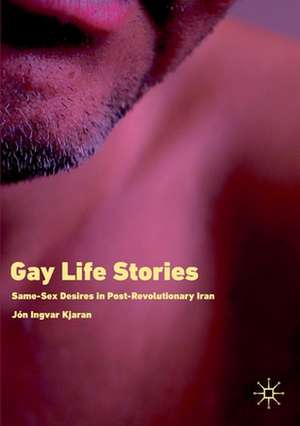Gay Life Stories: Same-Sex Desires in Post-Revolutionary Iran
Autor Jón Ingvar Kjaranen Limba Engleză Paperback – 8 aug 2020
| Toate formatele și edițiile | Preț | Express |
|---|---|---|
| Paperback (1) | 383.33 lei 6-8 săpt. | |
| Springer International Publishing – 8 aug 2020 | 383.33 lei 6-8 săpt. | |
| Hardback (1) | 504.36 lei 6-8 săpt. | |
| Springer International Publishing – 10 apr 2019 | 504.36 lei 6-8 săpt. |
Preț: 383.33 lei
Nou
Puncte Express: 575
Preț estimativ în valută:
73.36€ • 76.31$ • 60.56£
73.36€ • 76.31$ • 60.56£
Carte tipărită la comandă
Livrare economică 14-28 aprilie
Preluare comenzi: 021 569.72.76
Specificații
ISBN-13: 9783030128333
ISBN-10: 3030128334
Pagini: 233
Ilustrații: XVII, 233 p. 9 illus. in color.
Dimensiuni: 148 x 210 mm
Greutate: 0.3 kg
Ediția:1st ed. 2019
Editura: Springer International Publishing
Colecția Palgrave Macmillan
Locul publicării:Cham, Switzerland
ISBN-10: 3030128334
Pagini: 233
Ilustrații: XVII, 233 p. 9 illus. in color.
Dimensiuni: 148 x 210 mm
Greutate: 0.3 kg
Ediția:1st ed. 2019
Editura: Springer International Publishing
Colecția Palgrave Macmillan
Locul publicării:Cham, Switzerland
Cuprins
1. Introduction.- 2. Reading Foucault in Tehran.- 3. The Historical Contingencies and the Politics of Same-Sex Desire in Iran.- 4. The Construction of the Iranian Gay Subject Outside of Iran.- 5. Ethical Relationality and Accounts of Gay Iranian Men.- 6. Iranian Gay/Queer Activists and Activism.- 7. The “Sick Gay”: Being HIV-positive in Iran.- 8. Gay/Queer Spaces in Tehran: Intimacy, Sociality, and Resistance.- 9. Conclusion: Gay Livability in a Queer Dystopia
Notă biografică
Jón Ingvar Kjaran is Associate Professor in the School of Education at the University of Iceland and a senior researcher at the UNU GEST (United Nations University Gender Equality Studies and Training Programme).
Textul de pe ultima copertă
“Jón Ingvar Kjaran examines the complicated embodied experiences of gay-identifying men in Iran, focusing on their agency and the ways in which they carve out meaning in their lives. This is no easy task, since these men must resist both the official homophobic discourses of the state and the personal trauma they endure from family and society. The author shows the regional and class differences with regard to tolerance of a gay lifestyle. While many conservative communities disavow homosexuality and demonize same-sex desire, queer spaces exist in Tehran and other large urban areas where resistance can manifest itself in a variety of forms and where semi-open intimacy can take place. Despite its deep theoretical grounding, this is a highly enjoyable read, full of personal vignettes that will be of interest to both academic audiences and a general public.”
—Janet Afary, Mellichamp Chair and Professor of Religious Studies, University of California Santa Barbara, USA
Drawing on ethnographic encounters with self-identified gay men in Iran, this book explores the construction, enactment, and veiling and unveiling of gay identity and same-sex desire in the capital city of Tehran. The research draws on diverse interpretive, historical, online and empirical sources in order to present critical and nuanced insights into the politics of recognition and representation and the constitution of same-sex desire under the specific conditions of Iranian modernity. As it engages with accounts of the persecuted Iranian gay male subject as a victim of the barbarism of the Islamic Republic of Iran, the book addresses interpretive questions of sexuality governance in transnational contexts and attends to issues of human rights frameworks in weighing social justice and political claims made by and on behalf of sexual and gender minorities. The book thus combines empirical data with a critical consideration of the politics of same-sex desire for Iranian gay men.
—Janet Afary, Mellichamp Chair and Professor of Religious Studies, University of California Santa Barbara, USA
Drawing on ethnographic encounters with self-identified gay men in Iran, this book explores the construction, enactment, and veiling and unveiling of gay identity and same-sex desire in the capital city of Tehran. The research draws on diverse interpretive, historical, online and empirical sources in order to present critical and nuanced insights into the politics of recognition and representation and the constitution of same-sex desire under the specific conditions of Iranian modernity. As it engages with accounts of the persecuted Iranian gay male subject as a victim of the barbarism of the Islamic Republic of Iran, the book addresses interpretive questions of sexuality governance in transnational contexts and attends to issues of human rights frameworks in weighing social justice and political claims made by and on behalf of sexual and gender minorities. The book thus combines empirical data with a critical consideration of the politics of same-sex desire for Iranian gay men.
Caracteristici
Presents ethnographic narrative in concert with theories of space, sexuality, sexuality governance, and victimhood Provides critical and nuanced insights into the politics of recognition and representation in Iranian modernity Relevant for researchers in anthropology, sociology, gender studies, sexuality studies, Middle East studies, and international relations
